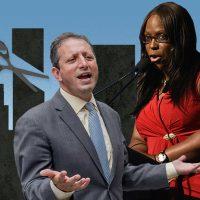The speeches began shortly after 10 p.m. and dragged on for more than two hours.
One City Council member after another explained why they were supporting or opposing the city’s $88 billion budget. Most of them talked about defunding the police. Many cheered programs for young people that had been saved.
But only one even alluded to the 21,000 units of affordable housing eliminated from the original spending plan. (Brad Lander lamented the $2.3 billion cut from housing, infrastructure and job creation, calling it “totally contrary to what Keynesian economics teaches us to do during an economic and fiscal crisis.”)
Read more


In a move decried by developers and Mayor Bill de Blasio’s own former deputy mayor for housing, Alicia Glen, more than $1 billion was erased over two fiscal years from funding to create or preserve affordable apartments. The mayor, who has staked much of his legacy on affordable housing, needed to offset $9 billion in expected tax revenue being wiped out by the pandemic. But Glen called it “penny wise and pound foolish” because housing subsidies leverage far more from private sources.
Two Council members, Brooklyn’s Lander and Vanessa Gibson of the Bronx, had released a report June 1 decrying the cuts.
Make no mistake: most or all of the 51 City Council members profess to love affordable housing. Why, then, did they drop it like a sack of potatoes?
In a nutshell: money and politics.
In the wake of George Floyd’s killing by police and the protests that followed, the political priority for the council was to shift funding from the NYPD to enrichment services seen as preventing crime, namely youth programs. For all the benefits of affordable housing, it is not often associated with crime reduction. Indeed, many of the city’s crime hotspots are in New York City Housing Authority developments.
So no politician made that case. Council member Margaret Chin instead blamed crime on poverty and said jobs were the answer. The chamber was geared up for job training and after-school programs, which benefit nonprofits in their districts and also happen to be a lot less expensive than refinancing or building low-rent apartments.
Which brings us to money. Most of the Department of Housing Preservation and Development capital funds cut, $583 million, were in the fiscal 2020 budget, which ended Tuesday. The council needed that savings to help balance fiscal 2021.
The second pot was $457 million cut from the new budget. Finding that amount in an $88 billion budget that just shrank by $7 billion is not as easy as it sounds. Yes, $1 billion was cut from the NYPD, but that did not actually free up $1 billion. Some police funding was shifted to other agencies, and $350 million was cut from police overtime — savings that no one thinks will actually materialize.
In the City Council pressure cooker that developed in recent days, the housing funds never had a chance. Speaker Corey Johnson had to negotiate a compromise budget with de Blasio that satisfied at least 25 other members and did not sabotage his own mayoral ambitions.
Rounding up votes was clearly a struggle, as indicated by the roll call being pushed back from 6 p.m. to 8 p.m. and then to 10 p.m. When the dust cleared early Wednesday morning, the budget had passed 32 to 17.
The many nay votes — a rarity for the Council — were all cast by members who waxed poetic on the chamber’s Zoom call about how the police had been cut too much or not enough. Gibson voted yes and Lander no, saying he wanted deeper NYPD cuts. Housing subsidies were never part of the conversation.
